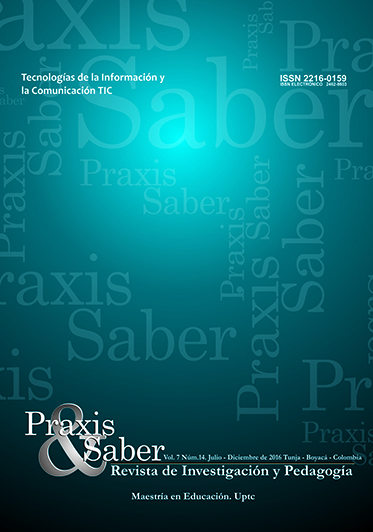La producción del conocimiento experiencial de los estudiantes en la educación superior

Resumen
El presente artículo hace referencia a un proyecto de investigación desarrollado en colaboración entre la Universidad Central “Marta Abreu” de Las Villas (UCLV), en Cuba y la Universidad Libre de Bruselas (VUB), en Bélgica durante los años 2010 al 2014, con el auspicio de Consejo Interuniversitario Flamenco (VLIR) que tuvo como culminación la defensa de una tesis doctoral en Ciencias de la Educación por partedel primer autor. El proyecto de investigación asociado a esta tesis doctoral fue financiado por VLIR-UOS (programa de colaboración interuniversitaria con la Universidad Central “Marta Abreu” de Las Villas) En este artículo de reflexión se expone una síntesis de la metodología utilizada para el desarrollo del proyecto de investigación y sus conclusiones. El documento original de la tesis está redactado en inglés.Palabras clave
gestión del conocimiento, conocimiento experiencial, proceso de enseñanza aprendizaje, educación superior
Biografía del autor/a
Didiosky Benítez Erice
Doctor en Ciencias de la Educación
Víctor Giraldo Valdés Pardo
Doctor en Ciencias Técnicas
Frederik Questier
Doctor en Ciencias Farmacéuticas
Dalgys Pérez Luján
Doctora en Ciencias Pedagógicas
Citas
- ADAMS, R., BESSANT, J., & PHELPS, R. (2006). Innovation management measurement: A review. International Journal of Management Reviews, 8(1), 21–47.
- https://doi.org/10.1111/j.1468-2370.2006.00119.x
- AFUAH, A. (2003). Innovation management: strategies, implementation and profits. New York: Oxford University Press.
- ALEXANDROPOULU, D., ANGELIS, V., & MAVRI, M. (2008). A Critical Review of the Impact of Knowledge Management on Higher Education. In: The Open Knowlege Society. A Computer Science and Information Systems Manifesto. Communications in Computer and Information Science, 19, 416-421.
- BENÍTEZ-ERICE, D. (2014). Students' experiential knowledge production in the teaching-learning process: the case of Universidad Central "Marta Abreu" de Las Villas. Vrije Universiteit Brussel, Bélgica.
- BOUD, D., KEOGH, R., & WALKER, D. (1985). Reflection: Turning experience into learning. London: Kogan Page.
- CRANFIELD, D. J., & TAYLOR, J. (2008). Knowledge Management and Higher Education: A UK Case Study. Electronic Journal of Knowledge Management, 6(2), 85 – 100.
- DALKIR, K. (2005). Knowledge Management in Theory and Practice. Oxford: Elsevier Butterworth–Heinemann.
- DAVENPOUR, F. (1991). Organizational innovation: A meta-analysis of effects of determinants and moderators. Academy of Management Journal, 34(3), 555-590.
- DAVENPORT, T. H., DE LONG, D. W., & BEERS, M. C. (1998). Successful Knowledge Management Projects. Sloan Management Review, 39(2), 43-57.
- DIXON, N. M. (1999). The Organizational Learning Cycle: How We Can Learn Collectively (Second Ed.). Verlag: Gower Publishing.
- ERAUT, M. (1994). Developing professional knowledge and competence. London: Falmer Press.
- ERAUT, M. (2004). Informal learning in the workplace. Studies in Continuing Education, 26(2), 248-273.
- FENWICK, T. J. (2001). Experiential Learning: A Theoretical Critique from Five Perspectives. Information Series No. 385.
- FIRESTONE, J. M., & MCELROY, M. W. (2003). Key issues in the new knowledge management. Knowledge Creation Diffusion Utilization. Burlington, MA: Butterworth Heinemann.
- FIRESTONE, J. M., & MCELROY, M. W. (2005). Doing knowledge
- management. The Learning Organization, 12(2), 189–212.
- HATTIE, J. (2009). Visible Learning: A Synthesis of Over 800 Meta-Analyses Relating to Achievement. London: Routledge
- JOHN, B., & RUTH, W. (2004). Collecting and using student feedback: A guide to good practice. Bristol: Higher Education Funding Council for England.
- KAKABADSE, N. K., KAKABADSE, A., & KOUZMIN, A. (2003). Reviewing the knowledge management literature: towards a taxonomy. Journal of Knowledge Management, 7(4), 75–91.
- KIDWELL, J. (2000). Applying corporate knowledge management practices in higher education. Educause Quarterly, (4), 28-33.
- KOLB, D. A. (1984). Experiential learning: experience as the source of learning and development. Englewood Cliffs, NJ: Prentice Hall.
- LEVITT, B., & March, J. G. (1988). Organizational Learning. Annual Review of Sociology, 14, 319-340. https://doi.org/10.1146/annurev.so.14.080188.001535
- LYNHAM, S. a. (2002). The General Method of Theory-Building Research in Applied Disciplines. Advances in Developing Human Resources, 4(3), 221-241.
- https://doi.org/10.1177/1523422302043002
- MADGE, C., MEEK, J., WELLENS, J., & HOOLEY, T. (2009). Facebook,
- social integration and informal learning at university: "It is more for
- socialising and talking to friends about work than for actually doing
- work." Learning, Media and Technology, 34(2), 141–155.
- MCELROY, M. W. (2000). Integrating complexity theory, knowledge
- management & organizational learning. Journal of Knowledge Management, 4(3), 195-203.
- MCELROY, M. W. (2003). The new knowledge management: complexity, learning, and sustainable innovation. Burlington, MA: Butterworth Heinemann.
- MCELROY, M. W. (2008). Social footprints: measuring the social sustainability performance of organizations. University of Groningen.
- NONAKA, I. (1994). A Dynamic Theory of Organizational Knowledge
- Creation. Organization Science, 5(1), 14-37.
- NONAKA, I., & TAKEUCHI, H. (1995). The knowledge-creating company: How Japanese companies create the dynamics of innovation. New York: Oxford University Press.
- OECD. (2004). Innovation in the knowledge economy: implications for education and learning. Paris: OECD Publishing.
- https://doi.org/10.1787/9789264105621-en
- PETERS, K., MARUSTER, L., & JOMA, R. J. (2010). Knowledge claim
- evaluation: a fundamental issue for knowledge management. Journal of Knowledge Management, 14(2), 243–257. doi:10.1108/13673271011032382
- https://doi.org/10.1108/13673271011032382
- PETERS, K. (2012). Theoretical and Empirical Explorations in Knowledge Claim Evaluation. University of Groningen.
- PETRIDES, L. A., & NODINE, T. R. (2003). Knowledge Management in Education: Defining the Landscape. Half Moon Bay: Institute for the Study of Knowledge Management in Education.
- PETRIDES, L. A., & LILLY, N. (2006). Knowledge management trends: Challenges and opportunities for educational institutions. In: Knowledge Management and Higher Education; A Critical Analysis. Information Science Publishing.
- PICCOLI, G., AHMAD, R., & IVES, B. (2000). Knowledge management in academia: a proposed framework. Information Technology and Management, 1(4), 229-245.
- https://doi.org/10.1023/A:1019129226227
- RAMACHANDRAN, S. D., SIONG CHOY, C., & ISMAIL, H. (2009). The
- practice of knowledge management processes: a comparative study of public and private higher education institutions in Malaysia. The Journal of Information and Knowledge Management Systems, 39(3), 203–222.
- ROWLEY, J. (2000). Is higher education ready for knowledge management? International Journal of Educational Development, 14(7), 325–333.
- SELDIN, P. (1997). Using student feedback to improve teaching. To Improve the Academy, 16, 335–346.
Descargas
Los datos de descargas todavía no están disponibles.